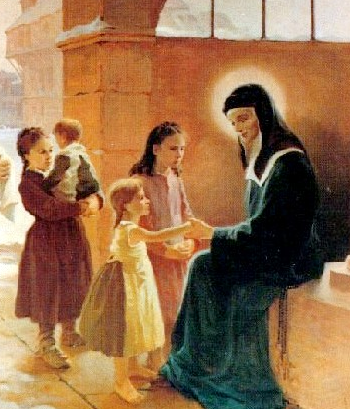I’m tired of Trump. There, I said it.
I find that the more I pay attention to Trump, the more angry and cynical I become. When I bring this anger to prayer, I feel better. I am reminded that I am held in the loving embrace of a God who is beyond my understanding. I am reminded that Jesus never said that it would be easy to follow him. And I feel emboldened to vote, and to keep talking to people about politics and the common good, and– perhaps most importantly–to keep praying.
There are so many different kinds of prayer in our faith tradition. Communal liturgy, of course. Lectio divina, yes. I even joined my mom’s contemplative prayer group a few weeks ago and remembered what a gift it is to simply sit in the presence of God. (They meet weekly to practice centering prayer and to discuss books about contemplative prayer– that week it was a book by Martin Laird). The examen in Ignatian spirituality provides still another way to pray. And of course, there is always the old stand by: “God, it’s Emily. HELP!!!!!!” Anne Lamott writes, in her small beautiful book Help, Thanks, Wow: The Three Essential Prayers:
We say, “Help.” We say, Help, this is really all too much, or I am going slowly crazy, or I can’t do this, or I can’t stop doing this, or I can’t feel anything. Or, Help, he is going to leave me, or I have no life, or I hate the one I’ve created, or I forgot to have a life, or I forgot to pay attention as it scrolled by. Or even, Help, I hate her so much, and one of my parents is dying–or will never die. Unfortunately, we haven’t even gotten to the big-ticket items yet: cancer, financial ruin, lost children, incontinence…
A Trump Presidency?
Yes, I bring that to prayer. I say, “Please God, Help.”
Another way we can pray is to invoke the wise and holy women and men of our faith tradition, and ask their assistance. Much like honoring our ancestors, we believe the boundary between the dead and the living is not so clear as the scientific imagination might lead us to believe. (Which is not to say that we pray to saints like Cinderella does to her fairy godmother… but more like a recognition that REALITY includes more than what we can see, touch, or feel, and so why not open our lives and imaginations to the possibility that souls from the past/present/future can assist us in ways we can’t fully understand?) But even if you don’t believe that praying to saints will have any real impact, perhaps their stories can simply inspire us to survive another day in this election cycle. As Robert Ellsberg has so eloquently written in Blessed Among All Women:
But from the real saints we have much to learn. We learn that what we call holiness was a quality expressed in the way they lived; in the choices they made; in their struggles to be faithful, even in the face of doubts and disappointments; in their everyday victories over pride and selfishness; in their daily efforts to be more truthful, loving, and brave.
And I bet there is not one among us who doesn’t need some help, every once in a while, in our daily efforts to be more truthful, loving, and brave.
So, here’s my humble suggestion: invoke the saints. They have your back. They want you to live the gospel in your own way, in your own context. Of course, their life experiences were very different than yours. But learning about their struggles can inform your own lived spirituality today.
Here are the saints I’ve been praying to a lot lately.
 St. Louise de Marillac, pray for us.
St. Louise de Marillac, pray for us.
Louise was the founder of the Daughters of Charity of St. Vincent de Paul. Obviously having St. Vincent de Paul as a spiritual director was pretty awesome, but she didn’t know at the time that he would be canonized too. Louise, a wealthy widow living in Paris, opened her home to train young women to care for the sick and the poor in her community. She believed that to follow the gospel, she needed to demonstrate her commitment by feeding the hungry, clothing the naked, caring for the sick, visiting the imprisoned. She nursed those suffering from the plague, and died, on March 15, 1642, telling her sisters to keep up the good work by serving the poor and “to honor them like Christ himself.” She was canonized in 1934. (Source: McBrien’s Lives of the Saints, 132-133).
Louise is the patron saint of social workers because she believed that God wanted us to thrive in community, and that we are inherently interdependent. We need each other. She also saw that in a context of suffering, good news= help. Gospel = help. This is radically different from Trump’s plan to repeal the Affordable Care Act “to make America great again” by “following free market principles,” eliminating health care for “illegal immigrants” and defunding Medicaid. Louise challenges us to see every person as worthy of medical care. She invites us to consider how each of us can respond to the needs of the suffering poor in our midst, and to vote accordingly.
 St. Genevieve, Pray for Us
St. Genevieve, Pray for Us
Have you thought about moving to Canada or Costa Rica if Trump wins? May I suggest prayers to St. Genevieve? While our information is a bit sketchy, as the story goes, she encouraged Parisians not to flee the city but to fast and pray in order to avert an attack by Attila and his Huns in 451. The invaders changed the route of their march, and Paris was spared (source: McBrien, Lives of the Saints, 64-65). Much later, in the twelfth century, pious believers prayed to St. Genevieve during a great epidemic and the epidemic subsided. She is the patron saint of those suffering from fever, but I think she would want US residents to stay here and fast and pray, instead of buying property in Canada or Costa Rica.
 Saints Cosmas and Damian, Pray for Us
Saints Cosmas and Damian, Pray for Us
Cosmas and Damian died in the third century, which was before google, so it is hard to find accurate information. McBrien tells us that according to legend they were twin brothers who– get this!– were “doctors who practiced medicine without taking any fees for their services.” (McBrien, Lives of the Saints, 390-391). Can you believe the scorn Trump would show for such foolish behavior? That’s why in the East they are known as the anargyroi (“moneyless ones”). I guess they were “losers” instead of “winners.” Cosmas and Damian were beheaded in Cyrrhus, north of Antioch, in Syria. And we live in a world where people are still beheaded for professing their Christian faith, just as Cosmas and Damian were. The next US president must have a plan for addressing ISIS. I believe that our strategy must include thoughtful intervention that addresses the underlying structural (and theological) issues at stake, with the ultimate goal of securing peace, as the just war tradition demands (again, slightly different from Trump’s “I will make the military so big, powerful, and strong that no one will mess with us.”).
Cosmas and Damian lived in a time of persecution, and paid the ultimate price for their efforts to heal the wounded and care for the needy. They are the patron saints of nurses, surgeons, pharmacists, dentists, barbers, the blind, and confectioners (? don’t ask me.).
 St. Therese of Lisieux, Pray for Us.
St. Therese of Lisieux, Pray for Us.
Therese, who called her spirituality “the little way,” entered the Carmelite convent at age 15 and died of tuberculosis at age 24. From those details, one might think her life has very little to teach us today, but as Robert Ellsberg writes, Therese “believed that each act of devotion, each moment of suffering patiently endured, might be credited to other souls in greater need” (Blessed Among All Women, 95). She called herself the Little Flower and believed that even ordinary people should struggle for purity and holiness, and that through all of these ordinary strivings, the world will become transformed through love. When we invoke the memory of St. Therese, we are invited to ask ourselves how we are living the call to love in the ordinary moments of our lives. In her autobiography, she wrote “I would like to perform the most heroic deeds!” And at another point, described her mission “to make Love loved.” She remained a person of hope, joy, and peace, even in great pain. To those of us who feel despair in our political discourse today, St. Therese’s little way tells us to let go of our hard-heartedness and act with love. Perhaps that means less time brooding on Facebook and more time researching other candidates’ position papers online? I’m not sure. But I don’t think Louise, Genevieve, Cosmas, Damian, or Therese would tell us to yield to despair. They would want us to do our part to make our country great, by living lives of virtue.





Trackbacks/Pingbacks